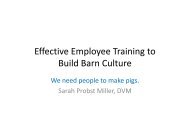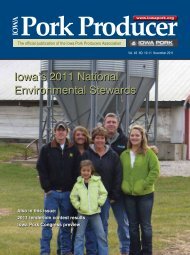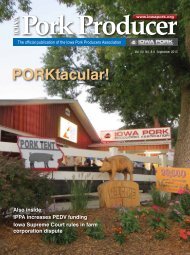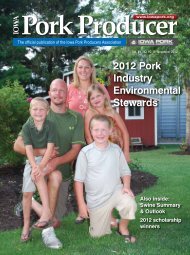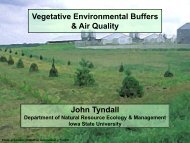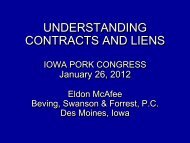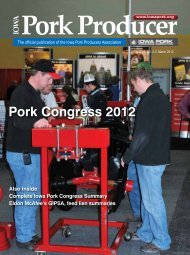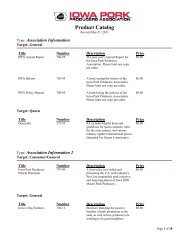September 2011 - Iowa Pork Producers Association
September 2011 - Iowa Pork Producers Association
September 2011 - Iowa Pork Producers Association
You also want an ePaper? Increase the reach of your titles
YUMPU automatically turns print PDFs into web optimized ePapers that Google loves.
funding was provided for voluntary conservation<br />
programs. These new resources will provide IDALS<br />
with much needed funds to assist in nitrogen<br />
and wetland on-the-ground projects. In addition,<br />
legislators pulled livestock and other fines<br />
administered by the <strong>Iowa</strong> Deptment of Natural<br />
Resources from the IDNR budget and placed those<br />
dollars into the <strong>Iowa</strong> Watershed Improvement<br />
Board (WIRB), administered by IDALS to further<br />
its voluntary on-the-ground water quality projects.<br />
Livestock Feeding Bill, S.F. 478<br />
This bill has been signed into law. It creates a state<br />
funding mechanism to deal with circumstances<br />
in which owners of livestock become financially<br />
unable to provide immediate sustenance (feed,<br />
water, adequate shelter) to their farm animals. The<br />
new law renames the manure storage indemnity<br />
fund to the “livestock remediation fund.” In<br />
addition, it allows IDALS to petition the courts for<br />
a superior lien on livestock fed under this program<br />
to recoup state-paid expenditures.<br />
Water Resources Council and Federal<br />
319 Funds, S.F. 535<br />
S.F. 535 has been signed into law. This legislation<br />
transfers the Water Resources Council from the<br />
office of the governor to the secretary of agriculture.<br />
In this bill’s original form, it also provided for the<br />
transfer of powers and duties for the administration<br />
of Section 319 of the federal Clean Water Act from<br />
IDNR to IDALS. However, late in the session, this<br />
bill was amended to remove all language pertaining<br />
to the transfer of the 319 funds administration.<br />
The final bill only transferred the Water Resources<br />
Council to IDALS.<br />
Ag Protection Act (Video and False<br />
Pretenses Bill), H.F. 589<br />
This bill passed the House but did not pass the<br />
Senate and therefore was not enacted into law.<br />
The bill would have prohibited tampering with<br />
property associated with an animal facility or crop<br />
operation and would have prohibited the production<br />
and possession of an audio or visual recording<br />
without the owner’s consent. The bill would also<br />
have prohibited anyone from gaining access to an<br />
animal facility or crop operation under false pretenses.<br />
Finally, the bill would have prohibited making a<br />
false statement as part of an employment application<br />
with the intent to commit an unauthorized act.<br />
The <strong>Iowa</strong> attorney general’s office considered the<br />
bill, as passed by the House, to be unconstitutional<br />
under First Amendment rights to free speech if it<br />
was enforced against those who had possession of<br />
a prohibited video, but did not participate in the<br />
production of the video.<br />
Subsequently, amendments to the bill were considered<br />
in the Senate to address these constitutional concerns.<br />
One amendment would have essentially eliminated<br />
the prohibition on production and possession of a<br />
video, but it retained the prohibitions on gaining<br />
access to an animal facility or crop operation under<br />
false pretenses and making a false statement as part of<br />
an employment application with the intent to commit<br />
an unauthorized act. The amendment would also<br />
have added prohibitions on conspiracy and aiding<br />
and abetting in committing the prohibited actions.<br />
None of these amendments passed and the Legislature<br />
adjourned without passing any version of the bill,<br />
although the measure remains alive for action in 2012.<br />
Electrical Licensing Requirements,<br />
H.F. 618<br />
This bill provided agriculture with a complete<br />
exemption from the current electrical licensing and<br />
inspection requirements. It passed the House, but<br />
was considered dead in the Senate. To move the issue<br />
forward, Sen. Steve Sodders and others developed<br />
a compromise, which IPPA supported, that would<br />
give farmers a seat on the electrical board that adopts<br />
rules on electrical issues, provide an exemption for<br />
small projects (100 amp or less), include a general<br />
maintenance provision, and an emergency provision<br />
in the case of major failure that might impact<br />
operational flow (power outage to hog facilities or<br />
drier failure in the middle of harvest). Although<br />
IPPA supported the full exemption, the association<br />
also sought the compromise to give members some<br />
relief from the current system. The Legislature<br />
adjourned without taking any action.<br />
SEPTEMBER <strong>2011</strong><br />
9




